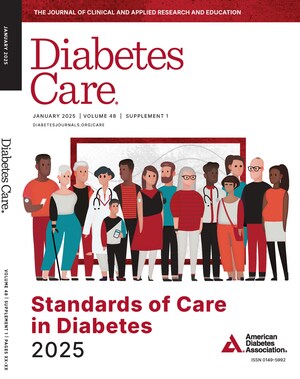ARLINGTON, Va., Nov. 22, 2016 /PRNewswire-USNewswire/ -- Living with diabetes can be challenging on many levels, and complex environmental, social, behavioral and emotional issues—known as psychosocial factors—influence the health of people living with the disease, as well as their ability to manage their diabetes. The American Diabetes Association has long addressed the psychosocial components of living with diabetes in its yearly Standards of Medical Care in Diabetes, which covers all aspects of quality care for people with diabetes. The Association has now issued its first position statement that provides comprehensive and specific guidelines for psychosocial assessments and care based on factors including age, type of diabetes and family support system.
The detailed recommendations are featured in "Psychosocial Care for People with Diabetes: A Position Statement of the American Diabetes Association," to be published in the December 2016 issue of Diabetes Care, which will be available online Nov. 22, 2016 at 3:00 p.m. ET.
The guidelines focus on the most common psychological factors affecting people with type 1 and type 2 diabetes, including diabetes distress, depression, and anxiety and eating disorders, and emphasize that diabetes management is more successful when lifestyle and emotional status are an integral component of diabetes care. The psychosocial care position statement is based on current diabetes research and recommendations from the field of mental health, and it combines the expertise of the article's authors, from leading research institutions including the National Institutes of Health, Johns Hopkins Medical School and Stanford University, among others.
"Diabetes is unique in that it is a disease that is managed on a daily basis by the person who has diabetes, and this can lead to increased stress," said Alicia McAuliffe-Fogarty, PhD, clinical health psychologist and vice president of the lifestyle management team at the American Diabetes Association. "People with diabetes have a greater risk of depression and anxiety, and while medical providers are trained to help people manage the medical aspects of their disease, they are not always taught to understand the impact that psychosocial factors have on people living with diabetes. Every person's needs are different, so individualized, patient-focused care that includes a mental health component should be a part of a comprehensive diabetes care plan for every person with diabetes."
Diabetes care providers are urged to assess the emotional health and life circumstances of a person with diabetes during an initial visit, and to conduct appropriate evaluations at regular intervals thereafter—even when a patient has not indicated any issues exist—in order to detect problems early. The position statement highlights extensive resources for psychosocial issues throughout the patient's lifetime, including a list of screening tools, and urges providers to consider a patient's individual needs, values and life stage when choosing screening tools and mental health referrals. Additionally, clinical providers are advised to refer patients to mental health providers who are knowledgeable about the issues faced by people with diabetes.
The challenges of incorporating such a comprehensive standard of care into clinical settings are recognized in the statement, including limited access to diabetes services by patients at lower socioeconomic levels and a lack of mental health professionals who understand the issues that patients living with diabetes face. The American Diabetes Association is collaborating with the American Psychological Association (APA) on an initiative that includes an education program to prepare psychologists to treat the mental health challenges faced by people living with diabetes, as well as a directory to assist with referrals. The first programs will launch at the Association's annual Scientific Sessions, June 9-13, 2017, and APA's 2017 Annual Convention, August 3-6, 2016.
The complete statement will be published online at http://care.diabetesjournals.org/content/39/12/2126 on Nov. 22, 2016.
About Diabetes Care®
Diabetes Care is a monthly journal of the American Diabetes Association to increase knowledge, stimulate research, and promote better health care for people with diabetes. To achieve these goals, the journal publishes original articles on human studies in the following categories: clinical care, education and nutrition; epidemiology, health services; and psychosocial research; emerging treatments and technologies; and pathophysiology and complications. The journal also publishes the Association's recommendations and statements, clinically relevant review articles, editorials and commentaries. Topics covered are of interest to clinically oriented physicians, researchers, epidemiologists, psychologists, diabetes educators and other health professionals. Diabetes Care is the highest-ranked, peer-reviewed journal in the field of diabetes treatment and prevention.
About the American Diabetes Association
The American Diabetes Association is leading the fight to Stop Diabetes® and its deadly consequences and fighting for those affected by diabetes. The Association funds research to prevent, cure and manage diabetes; delivers services to hundreds of communities; provides objective and credible information; and gives voice to those denied their rights because of diabetes. Founded in 1940, the Association's mission is to prevent and cure diabetes, and to improve the lives of all people affected by diabetes. For more information, please call the American Diabetes Association at 1-800-DIABETES (800-342-2383) or visit diabetes.org. Information from both of these sources is available in English and Spanish. Find us on Facebook (American Diabetes Association), Twitter (@AmDiabetesAssn) and Instagram (@AmDiabetesAssn).
SOURCE American Diabetes Association
Related Links
WANT YOUR COMPANY'S NEWS FEATURED ON PRNEWSWIRE.COM?
Newsrooms &
Influencers
Digital Media
Outlets
Journalists
Opted In






Share this article